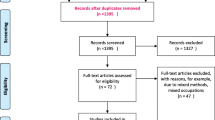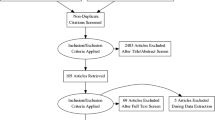Abstract
The majority of adolescents with mental health problems do not experience continuity of care when they reach the transition boundary of their child and adolescent mental health service. One of the obstacles for a smooth transition to adult mental health services concerns the lack of training for health-care professionals involved in the transition process. This study aims to seek psychiatric trainees’ opinions regarding training on transition and the knowledge and skills required for managing transition. A survey was distributed to trainees residing in European countries. Trainees from 36 countries completed the questionnaire, of which 63% reported that they came into contact with youth and young adults (16–26 years) during their clinical practice. Twenty-seven percent of trainees stated they have good to very good knowledge about the transition process. Theoretical training about transition was reported in only 17% of the countries, and practical training in 28% of the countries. Ninety-four percent of trainees indicated that further training about transition is necessary. The content of subsequent transition-related training can be guided by the findings of the MILESTONE project.




Similar content being viewed by others

References
World Health Organization. Atlas—Child and adolescent mental health resources—global concerns: implications for the future. 2005 https://www.who.int/mental_health/publications/atlas_child_ado/en/. Accessed on 6 Apr 2018
Kessler RC, Amminger GP, Aguilar-Gaxiola S, Alonso J, Lee S, Ustun TB (2007) Age of onset of mental disorders: a review of recent literature. Curr Opin Psychiatry 20(4):359
Singh SP, Paul M, Ford T, Kramer T, Weaver T (2008) Transitions of care from child and adolescent mental health services to adult mental health services (TRACK study): a study of protocols in Greater London. BMC Health Serv Res 8(1):135. https://doi.org/10.1186/1472-6963-8-135
Singh SP, Paul M, Ford T et al (2010) Process, outcome and experience of transition from child to adult mental healthcare: multiperspective study. Br J Psychiatry 197(4):305–312
Belling R, McLaren S, Paul M et al (2014) Slipping through the net: the impact of organisational resources and eligibility issues on transition from child and adolescent to adult mental health services. J Health Serv Res Policy 19(4):169–176
McLaren S, Belling R, Paul M et al (2013) ‘Talking a different language’: an exploration of the influence of organizational culture and working practices on transition from child to adult mental health services. BMC Health Serv Res 13:254
Signorini G, Singh SP, de Girolamo G et al (2017) Architecture and functioning of child and adolescent mental health services: a 28-country survey in Europe. Lancet Psychiatry 4(9):715–724. https://doi.org/10.1016/S2215-0366(17)30127-X
Paul M, Street C, Wheeler N, Singh SP (2015) Transition to adult services for young people with mental health needs: a systematic review. Clin Child Psychol Psychiatry 20(3):436–457
Coppens E, Vermet I, Knaeps J et al (2015) ADOCARE—a preparatory action related to the creation of an EU network of experts in the field of adapted care for adolescents with mental health problems. European Union, Brussels
National Institute of Health and Care Excellence (2016) NICE: transition from children’s to adults’ services for young people using health or social care services. https://www.nice.org.uk/guidance/qs140. Accessed 6 Apr 2018
Brittlebank A, Hermans M, Bhugra D et al (2016) Training in psychiatry throughout Europe. Eur Arch Psychiatry Clin Neurosci 266(2):155–164
Mayer S, Van der Gaag RJ, Dom G et al (2014) European Psychiatric Association (EPA) guidance on post-graduate psychiatric training in Europe. Eur Psychiatry 29(2):101–106. https://doi.org/10.1016/j.eurpsy.2014.01.002
Union Européenne des Médecins Spécialistes (2009) UEMS: European framework for competencies in psychiatry. http://uemspsychiatry.org/wpcontent/uploads/2013/09/2009OctEFCP.pdf. Accessed 6 Apr 2018
Frank JR (2005) The CanMEDS 2005 physician competency framework. Better standards. Better physicians. Better care. The Royal College of Physicians and Surgeons of Canada, Ottawa
Michaud PA, Schrier L, Ross-Russel R et al (2018) Paediatric departments need to improve residents’ training in adolescent medicine and health: a position paper of the European Academy of Paediatrics. Eur J Pediatr 177(4):479–487
Ryan S (2017) Entrustable professional activities for subspecialties: adolescent medicine. American Board of Pediatrics Entrustable Professional Activities, Chapel Hill. https://www.abp.org/subspecialty-epas#Adol. Accessed 6 July 2018
Singh SP, Tuomainen H, Warwick J et al (2017) Protocol for a cohort study of adolescent mental health service users with a nested cluster randomised controlled trial to assess the clinical and cost-effectiveness of managed transition in improving transitions from child to adult mental health services (the MILESTONE study). BMJ Open 7(10):e016055
Tuomainen H, Schulze U, Warwick J et al (2018) Managing the link and strengthening transition from child to adult mental health Care in Europe (MILESTONE): background, rationale and methodology. BMC Psychiatry 18:167
European Federation of Psychiatric Trainees (2017) Bylaws of European Federation of Psychiatric Trainees. Brussels, Belgium. http://efpt.eu/wp-content/uploads/2018/01/EFPTBylaws-approved-by-GA-3rdJuly2017.pdf. Accessed Jan 2019
Union Européenne des Médecins Spécialistes (2017) UEMS: charter on training of medical specialists in the EU: training requirements for the speciality of psychiatry. http://uemspsychiatry.org/wp-content/uploads/2012/01/ETR-Psychiatry-201703.pdf. Accessed 6 Apr 2018
Union Européenne des Médecins Spécialistes (2014) Training Requirements for the Specialty of Child and Adolescent Psychiatry. http://www.uemscap.eu/uploads/44/Training-Requirement-for-Child-adolescent-Psychiatry-approved_by_UEMS_Council_April_2014-pdf. Accessed 28 Jan 2019
Kuzman M, Giacco D, Simmons M et al (2012) Psychiatry training in Europe: views from the trenches. Med Teach 34(10):e708–e717
Lotz-Rambaldi W, Schäfer I, ten Doesschate R, Hohagen F (2008) Specialist training in psychiatry in Europe: results of the UEMS-survey. Eur Psychiatry 23(3):157–168
Aebi M, Kuhn C, Metzke C, Stringaris A, Goodman R, Steinhausen HC (2012) The use of the development and well-being assessment (DAWBA) in clinical practice: a randomized trial. Eur Child Adolesc Psychiatry 21(10):559–567
Union Européenne des Médecins Spécialistes (2014) European training log-book for child and adolescent psychiatry. http://www.uemscap.eu/uploads/45/UEMS_Logbook_final__-_12-01-2014_-_no_password-pdf. Accessed 28 Jan 2019
Acknowledgements
The MILESTONE project has received funding from the European Union’s Seventh Framework Programme for research, technological development and demonstration under Grant agreement no 602442. This paper reflects only the authors’ views and the European Union is not liable for any use that may be made of the information contained therein. This survey and response rate would not have been possible without the cooperation and efforts of the European Federation of Psychiatric Trainees. Especially, we would like to thank Teresa Gomez Alemany, the representative of the child and adolescent psychiatry section, and Livia De Picker, president 2015–2016. We are also grateful for all trainees who completed the survey. The MILESTONE consortium: members and partner institutions: Swaran Singh, Helena Tuomainen, Jason Madan, Jane Warwick, Cathy Street, Dieter Wolke, Moli Paul, Priya Tah, Rebecca Appleton, Alastair Canaway, James Griffin, Philip Wells, Rose-Marie Lomax (University of Warwick, UK), Giovanni de Girolamo, Giulia Signorini (Saint John of God Clinical Research Center, Italy), Paramala Santosh, Natalie Heaney, Mathilde Mastroianni, Federico Fiori (Kings College London, UK), Diane Purper-Ouakil, Frédérick Russet, Virginie Maurice, Véronique Humbertclaude (Hôpital Saint Eloi, France), Athanasios Maras, Larissa van Bodegom, Mathilde Overbeek (Yulius Academie, the Netherlands), Ulrike Schulze, Melanie Saam, Ulrike Breuninger, Anne Sartor, Elena Tanase (University of Ulm, Germany), Sabine Tremmery, Gaëlle Hendrickx, Veronique De Roeck (KU Leuven, Belgium), Fiona McNicholas, Aleksandra Gronostaj, Ingrid Holme (University College Dublin, Ireland), Tomislav Franić, Nikolina Davidović (University Hospital Split, Croatia), Frank Verhulst, Gwen Dieleman, Suzanne Gerritsen (Erasmus MC, The Netherlands), Kate Lievesley (HealthTracker, UK), Amanda Tuffrey, Anna Wilson, Charlotte Gatherer, Leanne Walker (Young project advisors), Andrea Wohner (concentris research management GmbH, Germany).
Author information
Authors and Affiliations
Consortia
Contributions
VDR, ST and GH developed the survey; VDR and GH collected the data; GH wrote the manuscript with assistance of ST and DPO; FR, HT, GD, TF, AM, FMN, MP, US, GS, SPS, CS, FV, PS, and DW contributed substantially to the writing by proving critical revisions regarding the intellectual content and approved the final version.
Corresponding author
Ethics declarations
Conflict of interest
The authors declare that they have no conflict of interest.
Additional information
This article is part of the focused issue ‘The European and Global Perspective on Training in Child and Adolescent Psychiatry’.
The members of the MILESTONE Consortium are given in acknowledgements section.
Electronic supplementary material
Below is the link to the electronic supplementary material.
Rights and permissions
About this article
Cite this article
Hendrickx, G., De Roeck, V., Russet, F. et al. Transition as a topic in psychiatry training throughout Europe: trainees’ perspectives. Eur Child Adolesc Psychiatry 29, 41–49 (2020). https://doi.org/10.1007/s00787-019-01309-5
Received:
Accepted:
Published:
Issue Date:
DOI: https://doi.org/10.1007/s00787-019-01309-5



